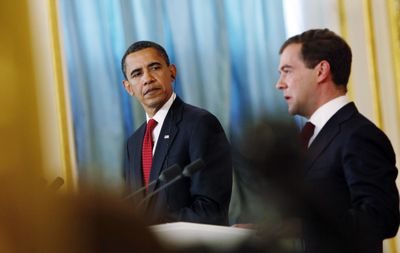Obama, Medvedev reach deal to cut nuclear arsenals
Agreement first step toward replacing expiring arms-control treaty

MOSCOW – President Barack Obama and Russian President Dmitry Medvedev reached a preliminary agreement Monday to cut the American and Russian nuclear arsenals by as much as a third while exploring options for cooperation on missile defense.
The agreement, which lays out a clear yet difficult path to replace a landmark arms-control treaty that expires in December, was the most significant among those signed at a summit designed to show that “resetting” relations between Russia and the United States could bridge longstanding differences.
The two leaders also signed pacts allowing the transit of U.S. military personnel and weapons through Russia to Afghanistan, restoring military-to-military ties, and pledging cooperation to limit the spread of nuclear materials.
The agreement instructs negotiators to draft a new accord that would maintain the critical verification mechanisms of the 1991 Strategic Arms Reduction Treaty and cut the number of deployed nuclear warheads in each country to between 1,500 and 1,675, down from the previous ceiling of 2,200.
“As the world’s two leading nuclear powers, the United States and Russia must lead by example, and that’s what we’re doing here today,” Obama said at a news conference in the Kremlin’s ornate St. Andrews Hall after the signing ceremonies.
Medvedev described the arms-control agreement as a “reasonable compromise” and “the first but very important step in the process of improving full-scale cooperation between our two countries.”
But the two leaders failed to resolve a dispute over the contentious question of reductions in missile launchers and bombers, agreeing only that the START limit of 1,600 such “delivery vehicles” for each country should be lowered to between 1,100 and 500.
The wide range reflects continuing U.S. unwillingness to accept the Kremlin’s demands for sharp cuts and could make it difficult for a new treaty to be negotiated and ratified before START expires.
The Russian military is worried the launchers and bombers could be used to quickly rebuild the U.S. nuclear arsenal and would pose a threat to Russian forces even if armed with nonnuclear warheads. But sharper reductions would be difficult for the Obama administration to accept politically.
The two presidents appeared to achieve progress in the long-standing dispute over U.S. missile defense plans, agreeing to work together to assess threats posed by countries such as Iran and North Korea. They also agreed to explore cooperation in missile defense and intensify talks on establishing a joint center for early detection of hostile launches.
While most of the agreements announced Monday were worked out by negotiators ahead of the summit, Obama and Medvedev reached the deal on missile defense themselves, said Michael McFaul, a senior Russia expert in the Obama administration.
Until the meeting, the Russians had refused to accept any statement on missile defense cooperation unless the United States also renounced plans for deploying the system in Poland and the Czech Republic.
Obama said he told Medvedev his administration was still completing a review of missile defense options in Europe and would brief Russia on its conclusions “as soon as that review is complete,” which he indicated should be before the end of the summer.
McFaul said the two sides were just beginning to talk about how they might cooperate on missile defense, but he expressed confidence the issue would no longer pose an obstacle to replacing START. “I get a sense we’re really on track to finish this irrespective of what happens on missile defense,” he said.
Aides said talk of Iran and missile defense dominated the nearly four-hour meeting Obama held with Medvedev. Accompanied by their wives, the two leaders and later reconvened for dinner at Medvedev’s dacha.
Independent analysts called the arms agreement a modest but significant first step.
“This is an agreement that is vitally important, because it maintains a system for verification and regulation of the world’s two largest arsenals,” said Daryl Kimball, executive director of the nonprofit Arms Control Association. “But the cuts they’re outlining are modest cuts. That’s understandable given the short timeline they have for completing a deal, but it also highlights how much more is left to be done.”
A new treaty is seen as the first step toward Obama’s goal of sharply reducing the world’s nuclear stockpiles. The Obama administration sees cuts by Russia and United States, which together control more than 90 percent of the world’s nuclear arsenal, as crucial to marshaling stronger international opposition to nuclear programs in Iran and North Korea.
Obama also sees the treaty as part of a larger nonproliferation effort that could lead toward the eventual elimination of nuclear weapons around the globe.
“This is an urgent issue and one in which the United States and Russia have to take leadership,” Obama said. “It is very difficult for us to exert that leadership unless we are showing ourselves willing to deal with our own nuclear stockpiles in a more rational way.”